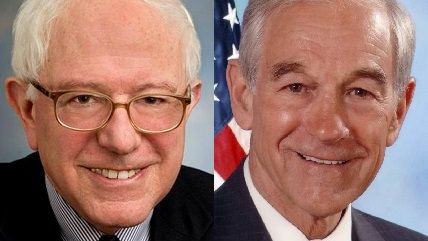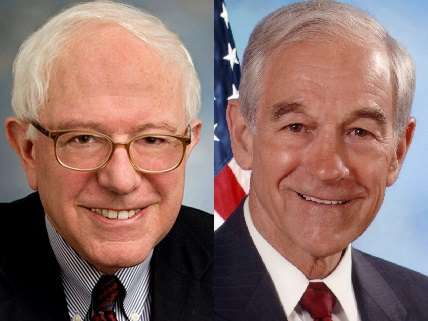Is Bernie Sanders the 2016 Ron Paul? He Can't Win Either, Media Points Out
Compare and contrast.


A series of articles earlier this month pointed out some of the similarities between Bernie Sanders' current presidential campaign and the 2008/2012 Ron Paul campaigns. Both candidates are former members of third parties, septuagenarians running outsider campaigns that appeal to a younger set of voters, that oppose foreign interventions, the surveillance and police states, and the drug war. For all the talking up of their similarities on the issue of bank bailouts and cronyism, Sanders didn't support Ron Paul's legislation to audit the fed. There are other big differences too.
At The Week Peter Weber writes: "Both men have a libertarian bent, though Sanders would be better described as a civil libertarian and Paul a fiscal one." Paul is, actually, a civil and fiscal one. The Washington Post puts it more accurately: "Sanders doesn't necessarily have a problem with the government getting involved in things — hence 'socialist' — and Paul generally does — hence 'libertarian.'" And neither Weber nor The Post, nor numerous other outlets see Bernie Sanders with any chance of winning. His supporters, like Ron Paul's facing the same narrative in 2008 and 2012, don't agree.
There is another difference between Sanders and Ron Paul. Ron Paul's ideas about limited government and civil liberties were outside establishment Republican thought in 2008. His two campaigns opened the door for candidates like Justin Amash in Michigan and his son Rand Paul in Kentucky and several others to run and win on "Ron Paul issues." Most media outlets won't say Rand Paul can't win, and a lot of that has to do with what the Ron Paul campaigns did. Bernie Sanders, on the other hand, I think, expresses ideas that aren't necessarily outside establishment Democrat thought. Here's David Harsanyi on a curious description of Hillary Clinton trying to sound like Bernie Sanders by saying the 1 percent needed "toppling" after she saw a chart on income inequality, placed in The New York Times by a Clinton source:
It's established media practice to talk about the GOP as the party that's lurched to the far right, an ideologically intractable group on a disturbing trajectory that leads to 2008-era tax rates and other forms of fanaticism. But I would love for someone to point out the last time a Democratic Party candidate suggested that government should topple an entire class of Americans for the good of everyone else. Has anyone, including Barack Obama, ever gone that far? Remember that this isn't just some slip of the tongue; this is Hillary's camp laying out a fantastical story to an accommodating media outlet—going out of its way to make sure the word "topple" would be specifically mentioned in quotation marks. Also, I'd love to know which economists nodded their heads in agreement as Hillary embraced this harebrained Robert Reich zero-sum economic "toppling" theory.
For many Democrats the anti-Hillary candidate is Elizabeth Warren. The differences between her and Sanders appear mostly rhetorical. Warren didn't support Rand Paul's audit the fed efforts either. The leaders of the only organized progressive effort in support of Bernie Sanders would prefer Warren to run. Few outlets, I think, would write that she couldn't win. Not so for Rand, even as his father indisputably helped force some of the ideas his son holds on the surveillance state, criminal justice reform, and other civil liberties issues into consideration by the Republican mainstream.
Show Comments (90)